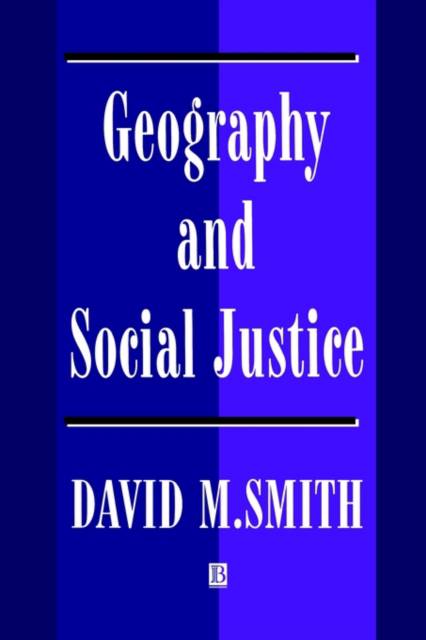
Bedankt voor het vertrouwen het afgelopen jaar! Om jou te bedanken bieden we GRATIS verzending aan op alles gedurende de hele maand januari.
- Afhalen na 1 uur in een winkel met voorraad
- Gratis thuislevering in België
- Ruim aanbod met 7 miljoen producten
Bedankt voor het vertrouwen het afgelopen jaar! Om jou te bedanken bieden we GRATIS verzending aan op alles gedurende de hele maand januari.
- Afhalen na 1 uur in een winkel met voorraad
- Gratis thuislevering in België
- Ruim aanbod met 7 miljoen producten
Zoeken
€ 88,45
+ 176 punten
Omschrijving
Human geography - cultural, economic, political, and social - is inherently concerned with social justice and injustice. So also are the associated fields of urban and regional analysis and planning: being born in one country, region or one part of a particular city many, for example, be the single most important factor in an individual's health, education, and longevity. It is clear that in every nation, including present and former socialist societies, wealth and privilege are unevenly divided. But would an equal division of resources really be preferable from a moral point of view? Is it even possible to propound universal prescriptions of what is socially just? or to talk about universal rights in a world in which different kinds of people (according to class, gender, race, and religion) are treated so differently in different places?
Such questions are far from simple. In this book David Smith, one of the world's leading geographical thinkers, throws incisive light upon them. He proceeds first by providing a critical and accessible review of relevant issues in social and moral philosophy, in particular the contrasting claims of different theories of social justice, and the nature of rights and needs. He examines John Rawls's proposition that inequality can be justified to the extent that it benefits the worst-off; and he considers how far justice may or should be seen as a process for equalization or of returning to equality, in the face of persistent and widespread inequality.
The author then applied theoretical perspectives to case studies. These are based on his own first-hand research, and cover racial injustice in the American South, inequality under socialism and its aftermath in eastern Europe, and the porspects for social justice in post-apartheid South Africa. David Smith examines the plight of those peoples who have no secure place or defined territory, focussing on the conflicting claims of the Palestinians and the Israelis. Finally he draws together elements of theory and experience to present trenchantly argued conclusions on the justice of market-led society, the ends of egalitarianism, and the universality of just principles. By both precept and example he shows the central contribution that geographers can make to the understanding of social justice in a complex and rapidly changing world.
Such questions are far from simple. In this book David Smith, one of the world's leading geographical thinkers, throws incisive light upon them. He proceeds first by providing a critical and accessible review of relevant issues in social and moral philosophy, in particular the contrasting claims of different theories of social justice, and the nature of rights and needs. He examines John Rawls's proposition that inequality can be justified to the extent that it benefits the worst-off; and he considers how far justice may or should be seen as a process for equalization or of returning to equality, in the face of persistent and widespread inequality.
The author then applied theoretical perspectives to case studies. These are based on his own first-hand research, and cover racial injustice in the American South, inequality under socialism and its aftermath in eastern Europe, and the porspects for social justice in post-apartheid South Africa. David Smith examines the plight of those peoples who have no secure place or defined territory, focussing on the conflicting claims of the Palestinians and the Israelis. Finally he draws together elements of theory and experience to present trenchantly argued conclusions on the justice of market-led society, the ends of egalitarianism, and the universality of just principles. By both precept and example he shows the central contribution that geographers can make to the understanding of social justice in a complex and rapidly changing world.
Specificaties
Betrokkenen
- Auteur(s):
- Uitgeverij:
Inhoud
- Aantal bladzijden:
- 344
- Taal:
- Engels
Eigenschappen
- Productcode (EAN):
- 9780631190264
- Verschijningsdatum:
- 14/06/1994
- Uitvoering:
- Paperback
- Formaat:
- Trade paperback (VS)
- Afmetingen:
- 156 mm x 229 mm
- Gewicht:
- 512 g

Alleen bij Standaard Boekhandel
+ 176 punten op je klantenkaart van Standaard Boekhandel
Beoordelingen
We publiceren alleen reviews die voldoen aan de voorwaarden voor reviews. Bekijk onze voorwaarden voor reviews.












